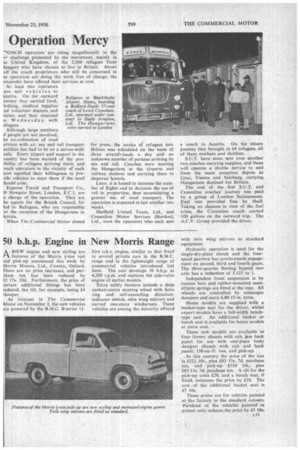Operation Mercy
Page 71

If you've noticed an error in this article please click here to report it so we can fix it.
""CIACH operators are rising magnificently to the
challenge presented by the movement, mainly in he United Kingdom, of the 2,500 refugees from lungary who have chosen to live in Britain. About alf the coach proprietors who will be concerned in he operation are doing the work free of charge: the emainder have offered their services.at cost.
At least two operators Lave sent vehicles to liustria. On the outward aurney they carried food, lothing. medical supplies ,nd volunteer doctors and Lurses, and they returned in Wednesday with efugees.
Although large numbers rf people are not involved, he co-ordination of road ervices with air, sea and rail transport acilities has had to be on a nation-wide cale. Every airport and seaport in the :ountry has been warned of the pos.ibility of refugees arriving there, and :oach operators in the vicinity of each save signified their willingness to proride vehicles to meet them if the need hould arise.
Express Travel and Transport Co., 39 Newgate Street, London, E.C.1, are n charge of the operation. They are he agents for the British Council for kid to Refugees, who are responsible or the reception of the Hungarians in 3ritain.
When The Commercial Motor closed for press, the intake of refugees into Britain was scheduled on the basis of three aircraft-loads a day and an unknown number of persons arriving by sea and rail. Coaches were meeting the Hungarians at the airports and railway stations and carrying them to dispersal hostels.
Later, it is hoped to increase the number of flights and to decrease the use of rail in proportion, thus necessitating a greater use of road transport. The operation is expected to last another two weeks.
Sheffield United Tours, Ltd., and Creamline Motor Services (Bordon), Ltd., were the operators who each sent a coach to Austria. On the return journey they brought in 64 refugees, all of them mothers and children.
S.U.T. have since sent over another two coaches carrying supplies, and these will operate a shuttle service to and from the main reception depots in Graz, Vienna and Salzburg, carrying Hungarians destined for Britain.
The cost of the first S.U.T. and Creamline coaches' journey was paid by a. group of London businessmen. Fuel was provided free by Shell. Taking no chances in view of the fuel crisis, the Creamline coach carried 100 gallons on the outward trip. The A.C.V. Group provided the driver.
















































































































